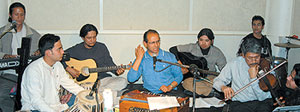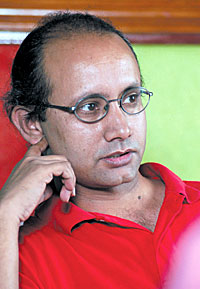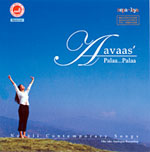 The stage is backlit and the silhouetted orchestra is already into an instrumental number as the audience enters. The small studio is packed with about two dozen music enthusiasts sitting cross legged on the padded floor.
The stage is backlit and the silhouetted orchestra is already into an instrumental number as the audience enters. The small studio is packed with about two dozen music enthusiasts sitting cross legged on the padded floor. This is the third of monthly concerts at nepa-laya's Paleti sit-down concerts with the freshest new voice in Nepali music: Avaas. Held on the last Friday of every month, Avaas sings his new songs, discusses them with fans, the audience is encouraged to interact and inevitably there are requests from his hit album, Palaa Palaa.
Last Friday was Phau and Avaas began with a number on Holi that he had recently composed and was performing for the first time. It is iconoclastic Avaas: the words and music tightly meshed, the rhythm of poetry in harmony with the tonal textures and between the lines always the social message.
There is another new song, a recent composition Eh Naulo Manchhe by Shrawan Makarung on the plight of people displaced from their land, nameless, faceless and stateless refugees. Avaas sings with feeling, the warmth of his voice and the colloquial simplicity of his words fill the tiny theatre and join performers and audience into an organic whole.
At intermission, nepa-laya has thoughtfully arranged apple brandy from Marpha (included in the ticket price) and the visitors tank up to get into the mood for the second half. Poet Manjul is in the audience and gets up to recollect how he and Avaas, newly-arrived in Kathmandu, struggled and created words and music. "Avaas was just a village kid trying to learn the tabla in those days," Manjul recalled, "but he understood the struggle and he felt deeply that Nepal belonged to all Nepalis."
 Indeed, the underlying message in the lyrics that Avaas chooses for his songs, whether they are his own or something he picks up from his poet friends, go to the heart of Nepal's current dilemma but always carrying a sense of hope. Both the words and the music uplifting. Explains Manjul: "It comes from Avaas' own quick-to-smile personality, his belief that we may be in darkness but soon the sun will rise, as it must."
Indeed, the underlying message in the lyrics that Avaas chooses for his songs, whether they are his own or something he picks up from his poet friends, go to the heart of Nepal's current dilemma but always carrying a sense of hope. Both the words and the music uplifting. Explains Manjul: "It comes from Avaas' own quick-to-smile personality, his belief that we may be in darkness but soon the sun will rise, as it must." Avaas honed his craft under the tutelage of Amber Gurung and you can hear echoes of the master in his words and music. Avaas says that if he likes the words of a poem he immediately turns it into song. "If it is good poetry, the words already carry the music, the musician doesn't have to do much," he explains.
Bhuikuhiro Udna Thalyo is from the Palaa Palaa album, most in the audience recognise poet Chandra Bhandari's lyrics and they sway with the jazzlike interludes by Raj Kumar Shrestha on the violin and Hari Maharjan on guitar. "I see some moist eyes," Avaas says after the applause, "tears have a meaning, Amber Dai used to say if someone sheds a tear while listening to your music it means there is still humanity left."
Avaas has kept what he regards as his best song till the end: the confessional and almost autobiographical self-composition, Godhulima Hidne with the haunting line: "Once he said he'd change the world but it changed him instead."
 The next concert by Avaas at the R sala will be on 29 April
The next concert by Avaas at the R sala will be on 29 April Limited tickets: 5542646
nepalaya@wlink.com


